Textile Engineering College, Chittagong
The Textile Engineering College, Chittagong (Bengali: চট্টগ্রাম টেক্সটাইল ইঞ্জিনিয়ারিং কলেজ) is a college in Bangladesh, offering bachelor's degree in textile engineering. It is situated by the side of old Dhaka Trunk road which passes through Zorargonj, Mirsharai, Chittagong. It is one of the seven textile engineering colleges which are collectively funded and controlled by the Ministry of Textiles and Jute.
চট্টগ্রাম টেক্সটাইল ইঞ্জিনিয়ারিং কলেজ | |
Other name | CTEC |
|---|---|
| Type | Public |
| Established | 1980 |
Parent institution | Bangladesh University of Textiles |
| Affiliation | Ministry of Textiles and Jute |
| Chairman | Prof. Engr. Md. Abul Kashem |
| Principal | Engr. Md. Ismail Molla |
Academic staff | 28 |
Administrative staff | 12 |
| Students | 420 |
| Undergraduates | 420 |
| Address | Zorargonj, Mirsharai Upazila , , |
| Campus | Suburban |
| Language | English |
| Sports | Football, cricket |
History
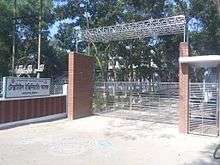
The college was established in 1911 and moved to its current location in 1960. A three-year textile engineering course was set up in 1994 which was superseded by a four-year Bachelor of Science course in textile engineering in the 2006-2007 session. It was declared as a college on 13 January 2006.
The college provides textile education. The Textile Engineering College operates under the administrative control of the Department of Textiles of the Ministry of Textile & Jute.
It was established in 1911 as a weaving school, which was the result of "Shawdeshi Andullon" during the British regime. It was transferred to the entry point of Mohuri Project Road in 1960. In 1980 the courses of the weaving school were up-graded to 2-year certificate course in textile technology, which was named as District Textile Institute.
In 1994 a 3-year Diploma course was introduced in the institution under the Bangladesh Technical Education Board. The duration of the course was extended to 4 years from 2001.
The government has introduced a 4-year Bachelor of Science in Textile Engineering affiliated to the University of Chittagong, abolishing the Textile Diploma Course from the session 2006–2007. From the 2012-2013 session the college was affiliated with Bangladesh University of Textiles.[1]
Curriculum
Textile Engineering College, Chittagong offers following B.Sc. in Textile Technology programs under the Bangladesh University of Textiles (BUTex).
Admission
Admission to the Textile Engineering College is competitive and needs a high academic attainment at the S.S.C and H.S.C levels. Selection of the student for admission is made through admission test.
Sixty percent of the total students will get stipend on the basis of merit at the rate of Tk. 150/= per month and 1000/= for purchase of books per year from the project.
Facilities
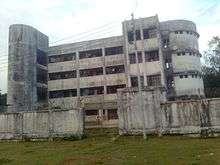
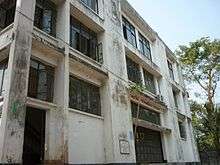
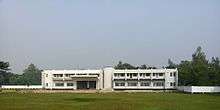
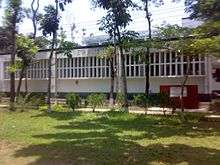
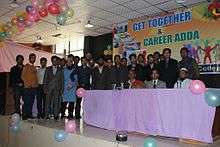
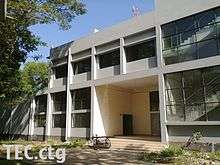
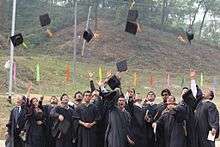
There are two hostels for male students and there is a hostel for female students.
The medical services include a medical center with one full-time doctor and a medical assistant. The students are examined free of cost.
The college library has a collection of technical and non-technical books. Library access is open to teachers, students and staff.
There is a co-ordination teacher for each year who looks after the students affairs.
Buildings
Practical sheds, workshops and laboratories of the college are:
- Yarn Manufacturing Laboratory: provides practical knowledge regarding the blow room section, carding machine, combing machine, ring frame, roving frame, automatic yearn texturing m/c (Reyter).
- Fabric Manufacturing Laboratory
- Weaving Laboratory: has the facility to weave cotton, synthetic and jute fabrics including tappet, dobby and jacquard loom, hand-operated loom, ordinary power loom, automatic power loom and modern loom with CAD system. Modern looms include air-jet & rapier loom.
- Knitting Laboratory: is equipped with Weft and Warp knitting machinery. Weft knitting machines include circular (single jersey, double jersey, rib, jacquard) flat knitting machine & V-bed machine.
- Wet Processing Laboratory: is equipped with sample dyeing, sample printing and washing machine, gas singeing machine, thermosol machine, jigger dyeing machine, hydro extractor machine, screen printing machine, screen preparation unit, squeezer machine, data color machine. ege.
- Garments Manufacturing Laboratory:equipped with cutting, sewing and finishing machinery.
- Fashion and Design Laboratory
- Testing and Quality Control Laboratory: has equipment needed to test the fiber, fabric, color fastness, and garments
- Computer Laboratory
- Physics Laboratory
- Chemistry Laboratory
- Engineering Workshop
- Jute Lab: equipped with OD batch mixer, Breaker Card, Finisher Card, Drawing( 1-4), Spinning frame, winding machine for jute and machines needed for jute processing from fiber to sacks.
References
- "Textile Engineering College, Chittagong". ctec.gov.